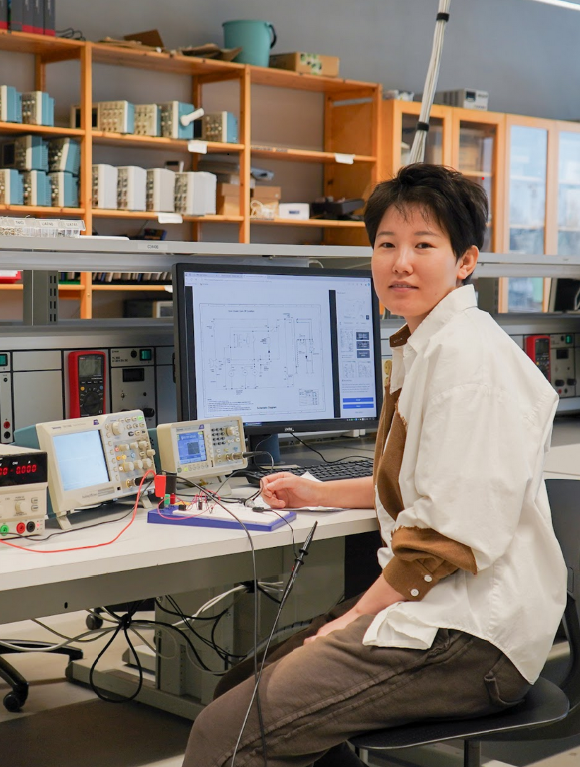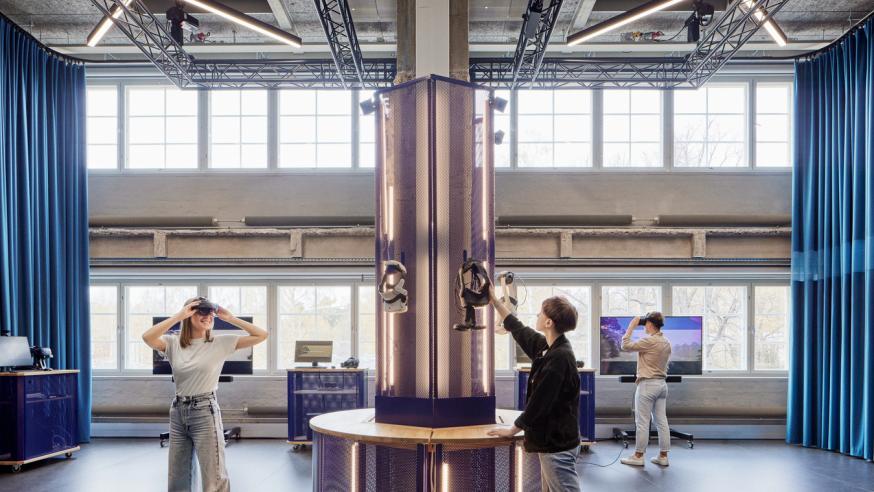Studies
Aims
The degree program in Electronics provides an inspiring and diverse learning environment for future experts and designers in the fast developing field of electronics. The degree program provides you the skills and knowledge to work as an engineer anywhere in the world in various positions.
Subjects
The expertise in the field of electronics is based on a broad and in-depth theoretical knowledge, which is built during the first two years of studies. During this time, students gain a comprehensive understanding of the fundamentals of electronics as well as the related physics and mathematical analysis. This equips students with the necessary tools to analyze and solve complex theoretical and practical problems.
In addition to theoretical studies, the implementation of the studies contains vast amount of practical exercises and projects, which enhance students' problem-solving skills and prepare them to work effectively with various systems and technologies.
You can specialize in the following areas of electronics, among others: embedded systems design, sensor technologies, radio technology, wireless communications, and electronics design and testing. Professional qualifications are supplemented with topics in project management, sustainable development, language and communication and information technology.
You will become familiar with intercultural aspects due to the multi-cultural study environment and student community.
Career Prospects
Upon graduation, students have a strong expertise in the field of electronics. They are capable of analyzing, designing, and implementing electronic systems for various application areas, such as communications, consumer electronics, medical devices, and automation. Depending on their interests, they can work in various roles such as design and technical specialists, technical sales, application engineers, or project managers.
As electronics engineer you may work for example as an electronics designer in a research laboratory with other specialists. You and your team design electronic circuits and systems for different applications in healthcare or energy management to mention a few.
You may also find yourself working in the field of production, quality control and testing as a system specialist or a team manager. In this role the environmental issues, sustainability and green energy are also strongly emphasized.
Studying electronics in Metropolia University of Applied Sciences gives you the keys to succeed in any of these interesting fields.
Scholarships and tuition fees
Annual tuition fee
- 12 000 € for those, whose right of study starts before 1 August 2022
- 11 000 € for those, whose right to study starts after 31 July 2022.
This fee applies only to non-EU/EEA degree students.
What is it like to study Electronics
Student stories

Q: Why did you choose Finland and Metropolia University of Applied Sciences?
I chose Finland because it’s known as the happiest country in the world and offers beautiful natural surroundings, like forests and lakes, which are very different from my home in China. Metropolia stood out to me because it is the largest university of applied sciences in Finland, offering a strong focus on technology. Its location in Helsinki, the capital, provides access to many opportunities, as well as convenient transportation and accommodations, which made it easier to settle in as an international student.
Q: How was your transition to living in Finland?
The transition was challenging, especially because I had to adjust to using English in daily life and studies. While I had studied English before, I hadn’t used it much in real-life situations, so it took time to become comfortable. Preparing mentally before moving was essential—I knew I was entering a completely different environment, so I stayed open-minded and ready to face challenges. Finnish winters were a unique experience. Last year’s snowy winter was beautiful, but this year’s longer wait for snow has felt more difficult. To adapt, I focused on building a social network. I connected with my roommates and attended community events, which helped me make friends and feel more at home.
Q: What has surprised you most?
I was surprised by how manageable Finnish winters are, despite their reputation. Snowy landscapes are stunning, and the winter isn’t as harsh as I feared. Another surprise was the cultural respect here—for example, cars stop for pedestrians, something I never experienced in China. The long summer holidays were another unexpected benefit. They give students the chance to gain practical experience through internships, which is very different from the shorter, more relaxed summer breaks I was used to back home.
Q: What do you enjoy about studying electronics?
I enjoy turning theoretical knowledge into practical applications. Building circuits and creating functioning devices feels magical. Labs make the learning process exciting, as they allow me to see the results of my work firsthand. Combining theory with practice is one of the most rewarding aspects of studying electronics.
Q: Any advice for future students?
Be prepared to invest time in labs, assignments, and group work—it’s not an easy field, but it’s highly rewarding. Collaborating with classmates can make problem-solving easier. Don’t stress too much about the first year; it’s focused on building foundational knowledge. Take the time to adapt, improve your language skills, and embrace the challenges of studying abroad.

Q: Why did you choose Finland and Metropolia University of Applied Sciences?
A: I discovered that Finnish universities of applied sciences are perfect examples where theoretical and practical learning come together seamlessly. These universities focus on developing students' potential in a way that enables them to actively contribute to the fast-evolving field of technology. Metropolia UAS stood out because of its reputation. The university's close ties with the tech industry in Finland provide excellent opportunities for internships, projects, and networking, which are crucial for building a successful career in electronics engineering.
Q: How was your transition to living in Finland?
A: I experienced a lot of new things when transitioning to life in Finland. I never saw any snow in my whole life. In the beginning the dark mornings and colder weather felt a bit hard, but I adjusted to the new climate quickly. Academically, I had to adapt to Finland's self-directed learning style, which emphasized independence and critical thinking. Adjusting to new culture takes some time, but Metropolia has been a very welcoming environment for an international student.
Q: What has surprised you most?
A: I joined the studies late, but since I first entered the classroom, I was integrated into the course and the study environment. I never expected my initial adjustment to studies to be that smooth. Another thing that surprised me was the beauty of Finnish nature. One sunny day during my first summer in Finland, I was riding my bike and stopped on a hill to look around. The sky above the woods was so beautiful that I instantly fell in love with the nature around me.
Q: What do you enjoy about studying electronics?
A: Studying in the electronics engineering degree program has been demanding but filled with rewarding experiences. Initially we learned more about fundamental things like programming, math and physics. However, studies have included lab exercises and group projects from the beginning. For me, the most important part of the studies is the way the teachers teach us to observe and solve problems.
Q: Any advice for future students?
A: As a student of electronics engineering you can engage yourself in hands-on learning with the support of experienced teachers. As an international student, I would recommend embracing the Finnish learning culture, adapting to the local environment, and taking the time to collaborate and build connections.
Ask Head of Degree Programme about studies
Subscribe to the Applicant’s Newsletter
You will receive information 1–3 times a year about Metropolia's degree programmes, application schedules, and studying with us.
Applying
- Application period-Start of studiesautumn 2025
- Day-time studies
Instructions for applying
In the spring 2025 Joint Application to higher education, you can apply to degree programmes that start in the autumn of 2025. The application period starts on the 8 January 2025 at 8 am and ends on the 22 January 2025 at 3 pm (local time in Finland).
All the information needed to apply can be found on the national Studyinfo.fi portal. At Studyinfo.fi you can find descriptions of degree programmes, application criteria, application instructions, application forms and much more.
Application fee
From January 2025 onwards there is going to be an application fee of 100 euros. The application fee is collected for applicants from countries outside EU/EEA seeking education leading to a degree in higher education. The Finnish National Agency of Education will collect the application fee in connection with filling in the Studyinfo application form. The application fees are introduced for applications starting 1 January 2025 and onwards, when applying for degree programmes beginning on or after 1 August 2025. There is no application fee for Finnish or EU citizens.
More about application fee in Studyinfo.fi.
Questions about application fees? Contact applicationfee [at] oph.fi (applicationfee[at]oph[dot]fi)The application fee does not guarantee that you will be offered admission to studies.
The International UAS Exam is a joint digital entrance exam of the Finnish Universities of Applied Sciences (UAS), used for selecting students to study programmes leading to a bachelor’s degree and conducted in English. The entrance exam is completed by the applicant’s own computer remotely online.
Read more about the International UAS Exam and language requirements on the website uasinfo.fi
- Application period-Start of studiesautumn 2025Apply now!
- Day-time studies
The Application on the Basis of Metropolia’s Open UAS Studies is aimed at those who have completed open UAS studies at Metropolia University of Applied Sciences. Studies are considered to be Metropolia's if they are entered in the Metropolia's study register, and open studies if they have not been completed with the right to study for the degree-leading education.
Application period: 1 May 2025 8:00 am - 31 October 2025, all times refer to local time in Finland.
In flexible admission (i.e. rolling admission) the study places are filled in the order in which applications are received, so that all applicants who meet all the student selection requirements are accepted on a first-come, first-served basis until the application ends or the study places are filled.All the information needed to apply can be found on the national Studyinfo.fi portal. At Studyinfo.fi you can find descriptions of degree programmes, application criteria, application instructions, application forms and much more.
Note: Many degree programmes accept applications on a continuous basis. However, applicants who are required to pay tuition fees should carefully consider the timing of their application. In most cases, it is not advisable to begin studies in the middle of a term (either autumn or spring), as tuition fees cannot be paid for only part of the term. For this reason, it is generally best to apply well in advance of the start of the term, so that studies can commence from the very beginning.
Application fee
From January 2025 onwards there is an application fee of 100 euros. The application fee is collected for applicants from countries outside EU/EEA seeking education leading to a degree in higher education. The Finnish National Agency of Education will collect the application fee in connection with filling in the Studyinfo application form. The application fees are introduced for applications starting 1 January 2025 and onwards, when applying for degree programmes beginning on or after 1 August 2025. There is no application fee for Finnish or EU citizens.
More about application fee in Studyinfo.fi.
Questions about application fees? Contact applicationfee [at] oph.fi (applicationfee[at]oph[dot]fi)The application fee does not guarantee that you will be offered admission to studies. The application fee is not refunded if you cancel your application or are not offered admission.
- Application period-Start of studiesautumn 2025Apply now!
- Day-time studies
The Application on the Basis of Finnish Higher Education Studies is aimed at those who have completed higher education studies in Finland. Studies are taken into account regardless of whether they have been completed as open studies or in education leading to a degree, or whether the right to study is valid or has expired.
Application period: 1 May 2025 8:00 am - 31 October 2025, all times refer to local time in Finland.
In flexible admission (i.e. rolling admission) the study places are filled in the order in which applications are received, so that all applicants who meet all the student selection requirements are accepted on a first-come, first-served basis until the application ends or the study places are filled.
All the information needed to apply can be found on the national Studyinfo.fi portal. At Studyinfo.fi you can find descriptions of degree programmes, application criteria, application instructions, application forms and much more.
Note: Many degree programmes accept applications on a continuous basis. However, applicants who are required to pay tuition fees should carefully consider the timing of their application. In most cases, it is not advisable to begin studies in the middle of a term (either autumn or spring), as tuition fees cannot be paid for only part of the term. For this reason, it is generally best to apply well in advance of the start of the term, so that studies can commence from the very beginning.
Application fee
From January 2025 onwards there is an application fee of 100 euros. The application fee is collected for applicants from countries outside EU/EEA seeking education leading to a degree in higher education. The Finnish National Agency of Education will collect the application fee in connection with filling in the Studyinfo application form. The application fees are introduced for applications starting 1 January 2025 and onwards, when applying for degree programmes beginning on or after 1 August 2025. There is no application fee for Finnish or EU citizens.
More about application fee in Studyinfo.fi.
Questions about application fees? Contact applicationfee [at] oph.fi (applicationfee[at]oph[dot]fi)The application fee does not guarantee that you will be offered admission to studies. The application fee is not refunded if you cancel your application or are not offered admission.
Useful links
More information
For more information on the application process please contact
Metropolia's Student and Admission Services:
+358 40 712 5100
admissions [at] metropolia.fi (admissions[at]metropolia[dot]fi)
Starting studies
How to start your studies in Metropolia
Welcome to study for a degree at Metropolia!
Congratulations! You have been admitted to Metropolia University of Applied Sciences and we are delighted to have you as a new member of our vibrant community of more than 16 000 students!
You have made an excellent choice - Metropolia offers you unique multidisciplinary opportunities throughout your studies with its strong connections to working life and active role in innovations built around socially significant phenomena.
We are happy to have you with us and help you with any questions you might have. Welcome to Metropolia!
The below information applies to students who have been accepted to study for a full degree at Metropolia. Make sure to complete all the steps in order to secure your study place.
Confirming a place of study requires certain formalities to be completed by the deadline. More detailed instructions below:
Non-EU/EEA students need a student residence permit. You can begin the student residence permit application online at Enterfinland.fi. Remember that you must personally visit a Finnish embassy or consulate as part of this process. Start your residence permit process as soon as possible, carefully following the immigration authorities' instructions and regulations, so that you can receive your permit in good time before your studies begin! You can find detailed information and advice on the residence permit requirements and procedures on the Finnish Immigration Service (Migri) website.
Note that participating online programmes does not entitle you receiving residence permit. See more about the topic in Finnish Immigration Service websites.
All Metropolia's students who do not have a Finnish personal identity code, have to apply for it before their arrival or register at the local registry office after their arrival to Finland to apply for one.
Students who have to apply for residence permit (i.e. non-EU/non-EEA citizens) before their arrival to Finland should ask to be registered in the Finnish Population Information System when they apply for their first residence permit. This way they will receive a Finnish personal identity code at the same time as they are issued with the permit. More information on this for residence permit applicants
Other students have to apply for the personal identity code from the local registry office of the city where you are living in.
More information on Digital and Population Data Services Agency (DVV).
More information on registration to the Finnish Population Information System
After you have received the personal identification code, remember to inform it to the Student and Admission Services with the official document. Acceptable documents are for example DVV:s document (Notification of registration), Finnish passport, Finnish identity card with a photo, issued by police, Finnish driver's license, residence permit or KELA card with a photo.
When you start as a new student you need to activate your user account. Activation is possible when the right to study begins. For joint application, activation is possible from 1 August.
The purpose of the activation is that you personally accept the rules of the account usage policy and start using your account. Activate your user account primarily using Mobile Certificate and Netbank User ID. Please read first the instructions in IT Services wiki.
If you do not have a Mobile Certificate or Finnish Netbank User ID, you can use the Candour ID application to authenticate yourself. After authentication, you will receive instructions on how to activate your user account. Please read first the instructions in IT Services wiki.
All foreign students (who are not EU citizens or citizens of Norway, Iceland, Liechtenstein or Switzerland) who come to Finland for the purposes of studying are required to have a health insurance, if the studies endure longer than three months.
More information on insurances
Student financial aid is for Finnish citizens. Foreign citizens are entitled to student financial aid if they live in Finland on a permanent basis for the purpose other than studying and they have registered as permanent residents in the Finnish population register system.
- Find out where your campus is located
- If you have a smart phone you can download the free HSL mobile app to get access to the public transportation Journey Planner and tickets (e.g. for travelling from the Helsinki-Vantaa airport to your apartment or from your apartment to the campus).
- If you have a smart phone you can download the Tuudo mobile app for free to get your digital student ID and student discounts (ID and discounts are available from the first day of the studies onwards)
- Information on student life and well-being, costs and finance, study environment etc.
New students need a laptop for their studies.
Minimum laptop requirements for new students:
- Windows 11 or Mac computer
- Intel i5/i7 processor (at least 8 gen), AMD Ryzen 5/7 or equivalent processor
- RAM 8 GB memory
- SSD hard disk min. 256 GB
The life cycle of the laptop should be at least 4 years. The estimated cost of a laptop meeting the recommended specifications is between €600 and €800 and upwards. If the student's studies are geared towards gaming or graphic design, for example, the laptop should have a more powerful graphics card and more SSD hard disk space.
The recommended operating system will depend on the degree programme and the area of specialisation. As a general rule, Microsoft Windows and Mac OS X are safe choices for a laptop operating system. Students of XR Design, 3D Animation and Visualisation and Visual Communication Design will be informed in the first weeks of their studies about the purchase of their own computer and the features they need.
Tuudo is a mobile app with which you can use various Metropolia web services easily on your smart phone. With Tuudo you can get VR, HSL, Matkahuolto and Kela student discounts immediately. The benefits are free for all Metropolia students.
In Tuudo you can check Metropolia, Admission Services, and student union METKA announcements, your schedule, study attainments, and cafeteria menus.
Get Tuudo on your phone from the app store for free and start using it!
During your studies, your support of well-being and health is Finnish Student Health Services (FSHS). The specialist in student health care offers you general, mental and oral health services and supports the well-being of study communities.
Our services can be used by students completing a bachelor’s or master’s degree at a university or a university of applied sciences who have registered as attending for the semester.
Master the facts! Familiarize yourself with our services and user instructions on the address fshs.fi, and the Health information resource on the address yths.fi/en/health-information-resource. You can also find information about appointments as well as current information about your service unit on the address yths.fi/en/service-units.
Start using Self! Self is the student’s own online service for health care issues at FSHS. In Self, you can manage appointment bookings, communicate via SelfChat and start a remote consultation. Log in to Self as a user immediately from the beginning of the semester and keep your contact details up to date for as long as you are a student. Read more: yths.fi/en/self-info.
The health care fee for students in higher education will be paid to Kela on your initiative (kela.fi/web/en/healthcare-fee-for-students-in-higher-education).
If you have social security coverage in another EU/EEA country or in Switzerland or the United Kingdom, you do not have to pay the healthcare fee. However, you can to use the FSHS’s services.
Metropolia does not have housing services to offer. Thus, it is the student's responsibility to find an accommodation for the period of their studies. There is a lot of competition in affordable housing, so it is important to start searching for a room many months prior to arrival. More information on accommodation
Already excited about starting your studies in Metropolia and meeting new people? On this page you will find welcome letters for each degree program.
Welcome letters are information packages prepared by your future tutors. They include, for example, important dates as well as information about studying, student benefits, or student life.
Create your own profile and sign up to JobTeaser portal now and stay up to date on job vacancies, training and upcoming recruitment events promoted especially to Metropolia students. There are hundreds of job opportunities available and a lot of information to support your career planning.
JobTeaser is a career portal where you can find lot of career information in one platform.
- Open jobs and traineeships
- Working life events
- Advice & guidance
- Employer profiles
Sign up and start exploring
Sign up to JobTeaser using your @metropolia.fi email address: https://metropolia.jobteaser.com/
You can also download a Jobteaser application.
Starting Electronics studies
All new students will receive an email with information about the orientation day in May 2025. Please contact the programme coordinator or head of degree Anssi Ikonen if you haven't received a message.
Studies start with an orientation day on Wednesday 20th August at 10.15 am at Myyrmäki campus.
Congratulations!
Welcome to study Electronics! You have made a great choice and we are happy to have you join our degree.
As a new student, you are bound to have questions. Please read carefully all the information on above in order to make the beginning of your studies as smooth as possible. Many of your questions will be answered at the beginning of your studies at the orientation day and during the orientation course.
The extent of the Degree programme in Electronics is 240 ECTS credit points (4 years). After completing all the required studies, you will be awarded a Bachelor of Engineering.
Electronics tuition takes place on Metropolia Myyrmäki campus (Leiritie 1, Vantaa). Your studies will include studies in natural sciences, range of electronics professional studies as well as project management, language and communication and IT studies.
Please familiarize yourself with Electronics curriculum before studies begin. You study group is TXD25S1.
Commencing your studies
Your studies begin with Orientation days on 20th and 21st of August at Metropolia's Myyrmäki campus in Vantaa.
We hope all new students will take part in the orientation day. You will receive essential information and advice concerning your studies in Metropolia UAS. You will enroll in your autumn courses and get you study schedules during the orientation day. At the orientation days you get to meet your fellow students, student tutors and mentors, and staff members.
It is absolutely essential that you contact the programme coordinator, if you are unable to attend the orientation days. If you cannot arrive in Finland before the start of studies, we can offer an alternative way to begin the studies.
We have also an Instagram group for international students in the field of technology in Myyrmäki campus administered by the mentor students. You may start following the group to receive information from mentor students.
Study schedule
Tuition will start according to the schedules on Monday 25 August 2025.
Please make sure that you will be able to join the study group in August. If you are required to apply for a residence permit, make sure to start for the application process as soon as possible. Studies are arranged at Metropolia UAS Myyrmäki campus require attendance from Monday to Friday. If you won't be able to arrive in Finland before your studies begin, make sure to contact the programme coordinator.
Arrangements before studies
Please start all the necessary arrangements (such as residence permit, housing, insurance etc.) as soon as possible after receiving the acceptance letter, so that you are able to commence your studies in August 2025. Make sure to read the general information above the degree related information.
Further information
If you have any questions concerning commencing your studies, please do not hesitate to contact:
Mr. Anssi Ikonen
Head of Degree
Degree Programme in Electronics
anssi.ikonen [at] metropolia.fi (anssi[dot]ikonen[at]metropolia[dot]fi)


